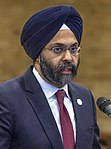2015 American Parliament election in the Kingdom of Sierra
|
| |||||||||||||||||||||||||||||||||||||||||||||||||||||||||||||||||||||||||||||||||||||||||||||
| |||||||||||||||||||||||||||||||||||||||||||||||||||||||||||||||||||||||||||||||||||||||||||||
All 65 Sierran seats in the American Parliament | |||||||||||||||||||||||||||||||||||||||||||||||||||||||||||||||||||||||||||||||||||||||||||||
|---|---|---|---|---|---|---|---|---|---|---|---|---|---|---|---|---|---|---|---|---|---|---|---|---|---|---|---|---|---|---|---|---|---|---|---|---|---|---|---|---|---|---|---|---|---|---|---|---|---|---|---|---|---|---|---|---|---|---|---|---|---|---|---|---|---|---|---|---|---|---|---|---|---|---|---|---|---|---|---|---|---|---|---|---|---|---|---|---|---|---|---|---|---|
| Registered | 29,844,233 | ||||||||||||||||||||||||||||||||||||||||||||||||||||||||||||||||||||||||||||||||||||||||||||
| Turnout | 45.1% ▼ 0.4% | ||||||||||||||||||||||||||||||||||||||||||||||||||||||||||||||||||||||||||||||||||||||||||||
|
| |||||||||||||||||||||||||||||||||||||||||||||||||||||||||||||||||||||||||||||||||||||||||||||
The Kingdom of Sierra component of the 2015 American Parliament election was held on May 16, 2015 and the results were announced on May 20 after all other members of the Conference of American States had finished voting. In total, 66 Members of the American Parliament were elected using proportional representation. Sierra used an open list system while the Deseret used the D'Hondt method and Hawaii used ranked-choice voting. West Colorado and West New Mexico were not allowed to vote for MAPs for Sierra and instead had their own elections on May 18.
The election was announced on May 1 with Prime Minister Steven Hong who had Parliament activate the American Parliamentary Elections Act of 1998 to begin preparations for the upcoming election. The election had garnered widespread attention within Sierra due to stakes that were involved as the Royalist and Federalist Party under Daniel McComb had made major gains in the 2013 Sierran federal election reducing the number of seats held by Hong's Progressive Coalition and McComb announced he would lead an aggressive campaign to see the Royalists, through their membership in the American Conservative Coalition, gain more seats within Sierra's delegation to the American Parliament.
Many issues had dominated the campaign, but the most notable ones were free trade, economics, regional security, and the national sovereignty of Sierra as a member of the CAS. The Democratic-Republicans ran on a unionist platform along with the Social Democrats and Green Party while the Royalists ran on a civic nationalist platform with McComb seeking to increase the ACC's representation in parliament in hopes of triggering a national referendum on Sierra's membership in the CAS and promoted Sierrexit on the campaign trail. The Libertarian Party and Christian Democrats were both ambiguous by comparison focusing on issues such as free trade and national security.
Voting began on May 16 and concluded on the 17, but it wouldn't be until May 20 that the final results were announced. The results were a major victory for the Royalists and the ACC which saw them win four seats and secure 25 of Sierra's 66 seat delegation to the American Parliament while the Democratic-Republicans, as part of the Liberal Democrats of America, had lost five seats winning 23 seats which was down from 28 in the previous election in 2010. The Libertarians won two seats and the Greens only one a single seat. The Christian Democrats also only won a single seat, but would later help the party expand to become a major force in Sierran politics in the years since the election.
During the election Giselle Delgado, Leader of the Social Democrats, had announced that she would run in the election and eventually became an MAP. Following the election, a leadership election was held and Delgado was succeeded by Marcel Guillory as party leader.
Voting eligibility
To vote in the election, individuals had to be the following;
- To be officially on the Voter Registry.
- Be 18 years or older on election day.
- Be a citizen of Sierra or the CAS.
- Resident address in Sierra or a Sierran overseas that's registered to vote in Sierra.
- To have not been legally excluded from voting.
Individuals were given until midnight on May 13 to register to be eligible to vote in the parliamentary election. Voters that lived in two homes such as college students living in dorms, but traveled home during holidays were permitted to register for both addresses as long as both homes were not in the same electoral area, but come election day they were only allowed to vote in one constituency. CAS citizens living in Sierra at the time had to register either online through the American Parliament Voter Registry Forum or submit a form to the Sierran voter registry identifying themselves as a non-Sierran CAS citizen by midnight May 13 in order to be allowed to vote. Such citizens were permitted to vote in Sierra, but were only allowed to vote for Sierran MAPs and not those in their native country citing where they were currently residing.
During the period to register, citizens in Sierra's territories were not allowed to register to vote and were instead allowed to register to vote for MAPs that would represent their respective territories instead. Both territories would have elections on May 18 and the deadline to register was on midnight, May 15 with only West Coloradans and West New Mexicans being allowed to register for said elections. This move was ordered by Hong who signed an executive order to initiate it and was singed into law on May 8 through the Territorial American Parliamentary Act of 2015.
Constituencies
The Kingdom of Sierra is divided into around 18 multi-member constituencies which include all Regions of Sierra, plus the Hawaiian Islands and the Colorado Valley and New Mexico. Since 1998, the Sierran electoral constituencies for the American Parliament are based upon officially recognized regions within Sierra and its devoted countries and territories. Seat allocation was changed for the 2015 election which increased the number of MAPs for Sierra's delegation to the American Parliament.
The breakdown of seats prior to the election was as follows;





